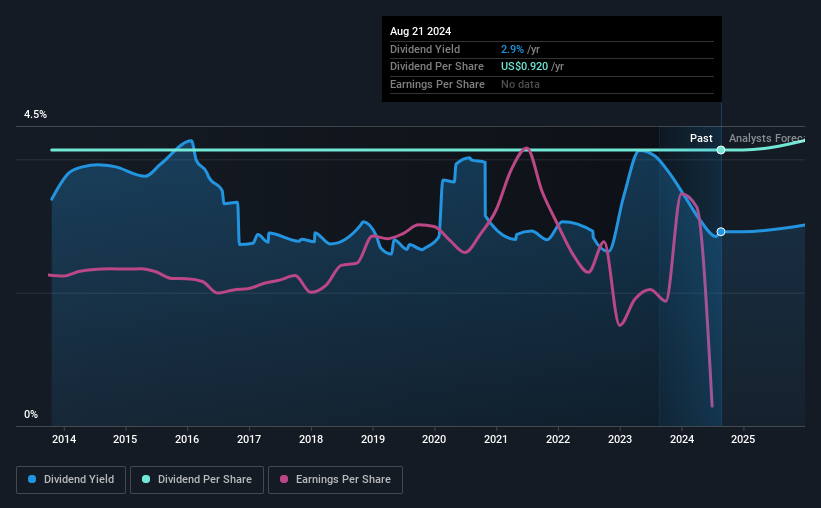The board of Trustmark Corporation (NASDAQ:TRMK) has announced that it will pay a dividend of $0.23 per share on the 15th of September. Based on this payment, the dividend yield will be 2.9%, which is fairly typical for the industry.
View our latest analysis for Trustmark
Trustmark Will Pay Out More Than It Is Earning
While it is always good to see a solid dividend yield, we should also consider whether the payment is feasible.
Having distributed dividends for at least 10 years, Trustmark has a long history of paying out a part of its earnings to shareholders. But while this history shows that the company was able to sustain its dividend for a decent period of time, its most recent earnings report shows that the company did not make enough earnings to cover its dividend payout. This is an alarming sign that could mean that Trustmark's dividend at its current rate may no longer be sustainable for longer.
The next 12 months is set to see EPS grow by 112.5%. If the dividend continues on its recent course, the future payout ratio in 12 months could be 186%, which is a bit high and could start applying pressure to the balance sheet.

Trustmark Has A Solid Track Record
Even over a long history of paying dividends, the company's distributions have been remarkably stable. The payments haven't really changed that much since 10 years ago. Although we can't deny that the dividend has been remarkably stable in the past, the growth has been pretty muted.
Dividend Growth Potential Is Shaky
The company's investors will be pleased to have been receiving dividend income for some time. Unfortunately things aren't as good as they seem. Trustmark's EPS has fallen by approximately 36% per year during the past five years. Such rapid declines definitely have the potential to constrain dividend payments if the trend continues into the future. On the bright side, earnings are predicted to gain some ground over the next year, but until this turns into a pattern we wouldn't be feeling too comfortable.
Trustmark's Dividend Doesn't Look Sustainable
In summary, while it's good to see that the dividend hasn't been cut, we are a bit cautious about Trustmark's payments, as there could be some issues with sustaining them into the future. Although they have been consistent in the past, we think the payments are a little high to be sustained. We would be a touch cautious of relying on this stock primarily for the dividend income.
Market movements attest to how highly valued a consistent dividend policy is compared to one which is more unpredictable. Still, investors need to consider a host of other factors, apart from dividend payments, when analysing a company. For example, we've picked out 3 warning signs for Trustmark that investors should know about before committing capital to this stock. Looking for more high-yielding dividend ideas? Try our collection of strong dividend payers.
Valuation is complex, but we're here to simplify it.
Discover if Trustmark might be undervalued or overvalued with our detailed analysis, featuring fair value estimates, potential risks, dividends, insider trades, and its financial condition.
Access Free AnalysisHave feedback on this article? Concerned about the content? Get in touch with us directly. Alternatively, email editorial-team (at) simplywallst.com.
This article by Simply Wall St is general in nature. We provide commentary based on historical data and analyst forecasts only using an unbiased methodology and our articles are not intended to be financial advice. It does not constitute a recommendation to buy or sell any stock, and does not take account of your objectives, or your financial situation. We aim to bring you long-term focused analysis driven by fundamental data. Note that our analysis may not factor in the latest price-sensitive company announcements or qualitative material. Simply Wall St has no position in any stocks mentioned.
About NasdaqGS:TRMK
Trustmark
Operates as the bank holding company for Trustmark National Bank that provides banking and other financial solutions to individuals and corporate institutions in the United States.
Flawless balance sheet established dividend payer.
Similar Companies
Market Insights
Weekly Picks


Crazy Undervalued 42 Baggers Silver Play (Active & Running Mine)


Fiducian: Compliance Clouds or Value Opportunity?

Willamette Valley Vineyards (WVVI): Not-So-Great Value
Recently Updated Narratives

SLI is share to watch next 5 years


The "Molecular Pencil": Why Beam's Technology is Built to Win

PRME remains a long shot but publication in the New England Journal of Medicine helps.
Popular Narratives


MicroVision will explode future revenue by 380.37% with a vision towards success


NVDA: Expanding AI Demand Will Drive Major Data Center Investments Through 2026




